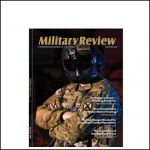
e-Document
|
Military Review, January-February 2006.
Copies
0 Total copies, 0 Copies are in,
0 Copies are out.
The Objective Beyond War: Counterinsurgency and the Four Tools of Political Competition Montgomery McFate, Ph.D., J.D., and Andrea V. Jackson Beating the opposition requires COIN forces to make it worthwhile for the civilian population to support the government. How? By providing security-or taking it away.
Political Islam in West Africa and the Sahel Ricardo Laremont, Ph.D., and Hrach Gregorian, Ph.D. Since 9/11, homeland defense is a particularly urgent issue. Three serious threats to U.S. security are found in West Africa and the Sahel.
The Second Learning Revolution Major General Robert H. Scales, U.S. Army, Retired Our experience in Vietnam revealed serious faults in the way we prepared for war. In that conflict, Soldiers learned that superior technology alone could not ensure victory.
Reconstitution of a Heavy Division: 1st AD Prepares for War Major Kevin Rants, U.S. Army Given an opportunity to fine-tune their recovery plan, 1st Armored Division logisticians completely retooled the division in a mere 10 months.
Operation Unified Assistance: Tsunami Transitions Lieutenant Colonel James Daniel, U.S. Army In 2004, a tsunami struck Southeast Asia, leaving thousands of people dead or homeless. President George W. Bush directed PACOM to launch Operation Unified Assistance to provide relief.
NATO: Rewarding Service in the Alliance Major General Rick Lynch, U.S. Army, and Lieutenant Colonel Phillip Cuccia, U.S. Army Although the Army's focus is on Afghanistan and Iraq, we must understand NATO's operational capabilities and limitations.
Knowing the Rules: Planning Considerations for NATO Operations Lieutenant Colonel David M. Toczek, U.S. Army U.S. Army planners working with NATO face many challenges, including differences in logistics, communications, command relationships, troop availability, and national capabilities.
2d Place MacArthur Award-The Great Captains of Chaos: Developing Adaptive Leaders Major F. John Burpo, U.S. Army To attract and develop people to become adaptive leaders possessing enhanced skills, we must align leader-development programs for the new operating environment.
3d Place MacArthur Award-Leading Change: Could a Joint OER Be the Catalyst of Army Transformation? Major Marshall V. Ecklund, U.S. Army Adopting a joint OER would demonstrate the Army's commitment to developing leaders who think critically and strategically.
Control Roaming Dogs: Governance Operations in Future Conflict Major Troy Thomas, U.S. Air Force Governance operations have been treated as tangential postconflict missions, leaving field commanders ill-prepared for governance tasks and delaying consolidation of political aims.
Space: Inextricably Linked to Warfighting Lieutenant General Larry J. Dodgen, U.S. Army Moving from being "supported" by space assets to being "space-enabled," the Army is integrating space capabilities into routine operations to deliver space-based services to Soldiers.
The Modular Force: Division Operations Lieutenant Colonel Telford E. Crisco, Jr., U.S. Army The modular force division represents a step forward in our ability to generate and tailor more versatile combat power.
Soldiers in the Public Square: The Legacy of the Newburg Conspiracy Lieutenant Colonel Dennis P. Chapman, U.S. Army National Guard Military participation in the political debate on Iraq or any other issue would undermine the central feature of our government: checks and balances.
Preparing Field Grade Leaders for Today and Tomorrow Brigadier General Volney J. Warner, U.S. Army, and Lieutenant Colonel James H. Willbanks, U.S. Army, Retired, Ph.D. To respond to the Army's needs in meeting the challenges of the current dynamic operational environment, CGSC is undergoing a transformation.
Insights What's Wrong in Iraq? Or Ruminations of a Pachyderm Colonel John D. Waghelstein, U.S. Army, Retired
Letters to the Editor
Book Reviews Contemporary readings for the professional
Title
Military Review, January-February 2006.
Call No
CDMC Military Review
Digital Link
Language
English
Published
Fort Leavenworth, KS : Combined Arms Center,, 2006.
Series
Target Audience
Unknown or not specified
MLA
APA
Chicago
0
/
0








